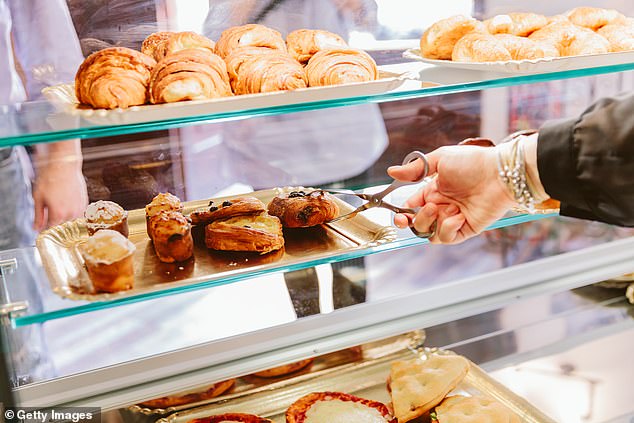Having lived with a severe wheat allergy for 30 years, occupational therapist Marcelle Williams had learned to shop with care.
So when one evening in December last year she was overcome with hunger after a long day at work on the Covid-19 front line, she ensured she picked up a suitable snack.
As she dashed into the branch of Marks & Spencer local to Queen’s Hospital in Romford, Essex, where she works, Marcelle, 62, selected a cinnamon swirl from the shelves displaying the retailer’s ‘Made Without’ range of products; made without major food allergens such as nuts, dairy, egg and wheat.

Having lived with a severe wheat allergy for 30 years, occupational therapist Marcelle Williams had learned to shop with care
‘I love their cinnamon swirls and often buy them,’ says Marcelle, who retired from the NHS two years ago but returned to help during the pandemic. But seconds after biting into the pastry on her bus journey home, Marcelle realised there had been a dreadful mistake.
‘My lips started to swell and my skin began itching all over,’ says the mother-of-two, who has three grandchildren.
She was going into anaphylactic shock, where the immune system floods the body with a chemical called histamine to flush out what it thinks is a large-scale invasion of the allergy trigger. This makes breathing difficult by inflaming the airway and triggering a life-threatening slump in blood pressure.
Marcelle has an EpiPen, a self-administered injection of adrenaline, which stops the potentially fatal reaction in its tracks.
‘The trouble is, when I suffer anaphylaxis, my hands and fingers swell up quickly and become like claws,’ says Marcelle. ‘They get so swollen it makes injecting myself with an EpiPen impossible.’
She managed to phone her partner, Tony Joyce, 68, and he drove to the next bus stop, before getting her straight to A&E.

Marcelle, 62, selected a cinnamon swirl from the shelves displaying the retailer’s ‘Made Without’ range of products; made without major food allergens such as nuts, dairy, egg and wheat [File photo]
‘Shortly after arriving at hospital, I passed out,’ says Marcelle. ‘Poor Tony had to wait outside due to Covid restrictions and for the next 15 or 20 minutes he had no idea if I was dead or alive.’
Medical staff swiftly administered more adrenaline and gave her antihistamines and albuterol to open her airway.
‘When I woke up 20 minutes later, I also had a mask over my face carrying oxygen into my lungs as my oxygen levels were low,’ says Marcelle.
She was discharged later that night with an eight-day course of steroid tablets to suppress any lingering inflammation. ‘For the next couple of days, I was exhausted and drained,’ she says.
Once the shock subsided, anger set in. The next day Marcelle and Tony revisited the store to check the display and found cinnamon swirls made with wheat stacked up on the ‘Made Without’ shelves.
‘I was fuming,’ says Marcelle. ‘The two products are displayed side-by-side, with no partition between the shelving units.
‘The shelf with normal cinnamon swirls was full so somebody had moved the surplus over to the “free-from” shelf.
‘This was an accident waiting to happen and when I complained to M&S, I got an apology and a £50 voucher,’ says Marcelle. ‘It barely covered the cost of the bra that doctors had to cut off with a pair of scissors to save my life.’
In a statement to Good Health, M&S admitted the items were in the wrong place but insisted the cinnamon swirl pack ‘was clearly labelled as containing wheat’ and the Made Without range is in a ‘specific bold design’ to distinguish allergen-containing foods.
The company said: ‘We take allergens extremely seriously. We were sorry to hear about this customer’s experience but this was an isolated incident.’ Later this week, new legislation — called Natasha’s Law — comes into force that compels all food retailers (from the supermarket giants to family-run cafes) to ensure every item of pre-packaged food for direct sale lists every ingredient and allergen.
However, while welcome, the rules will not eradicate the errors that endangered Marcelle.
And Dr Isabel Skypala, a consultant allergy dietitian at the Royal Brompton Hospital, London, says while food retailers have improved the range of free-from products for the two million people with food allergies in the UK, mistakes are still being made.
‘This is quite a serious case of human error and if Marcelle had eaten the whole swirl, she would have been exposed to a sizeable amount of wheat,’ she says.
Dr Skypala said she has heard of other cases where allergen-containing products had not been labelled properly and purchased by those with food allergies.
‘Most of these cases involve loose or unpackaged foods and I advise my patients with severe food allergies not to buy them,’ she says.
The kind of errors that led to Marcelle fighting for her life are more common than we think.
In March, Asda came under fire after a customer spotted that the Scan & Go app for online shopping failed to highlight allergens in a number of items.
This came to light when the mother of a young boy with a severe egg allergy double-checked products she’d bought, described on the app as egg-free, only to find they did contain egg. Luckily, she noticed before her child ate them.
Another shopper with a dairy allergy claimed the app failed to list milk on certain products. Asda said it was due to a technical error and it was in the process of updating the app to display all allergy-related information.
But some campaigners feel these mistakes, however rare, are symptomatic of the food retail sector’s long-running complacency over severe food allergies.
‘Marcelle could have died and I’ve heard similar stories from other people,’ says Nadim Ednan-Laperouse, whose daughter Natasha died aged 15 on a flight from Heathrow to Nice in July 2016 after an allergic reaction to sesame in a baguette from high street chain Pret A Manger.
Nowhere on the wrapper did it say it was an ingredient. Her parents have spearheaded Natasha’s Law, which sets out that any sandwiches or other items prepared by staff must have a label listing every single ingredient and allergen. Ideally, these should be printed but can be hand-written.
Businesses must comply by the October 1 deadline or face hefty fines or even prosecution.
‘It has always been entirely down to the allergy sufferer to be extra vigilant,’ says Nadim. ‘But Natasha’s Law fires the first shot across the food sector’s bows. Businesses must now comply — it’s non-negotiable’.
Research from Imperial College London shows UK hospital admissions for food allergies have tripled in 20 years, with the largest increase in children under 15.
Deaths have declined, mostly owing to a 300 per cent surge in prescriptions of life-saving devices such as EpiPens.
But the Natasha Allergy Research Foundation fears deaths are being under-reported — or wrongly attributed to other causes — and wants a national register of anaphylaxis deaths related to food.
‘That anyone should die from an allergy in the 21st century is a real tragedy,’ says Sir Stephen Holgate, a professor of Immunopharmacology and a trustee of the foundation.
Marcelle says retailers should display all allergen and free-from products metres apart.
‘Food shopping can be a life-and-death situation for a lot of people,’ she says. ‘A simple measure like this isn’t too much to ask.’
Revolting remedies
Medical treatments that might make your stomach turn. This week: Maggots
Maggot therapy is commonly used in the NHS for debridement, the removal of dead, unhealthy or infected tissue, as well as to clean surgical and trauma wounds and leg and pressure ulcers.
‘Maggot therapy can be used when other ways to remove this tissue aren’t suitable,’ explains Samantha Holloway, a reader in wound healing and tissue repair at Cardiff University School of Medicine in Wales.
‘For example, scalpels can cause excessive bleeding, and some specialist dressing can take weeks to get the same result as maggots. They’re not only quick and effective at removing dead tissue, they also have an antimicrobial effect [thanks to the compounds they release] that help manage infection in the wound, which speeds recovery.’
Advertisement
Source link : https://www.dailymail.co.uk/health/article-10034801/The-M-S-cinnamon-swirl-left-woman-fighting-life-bus-home.html











